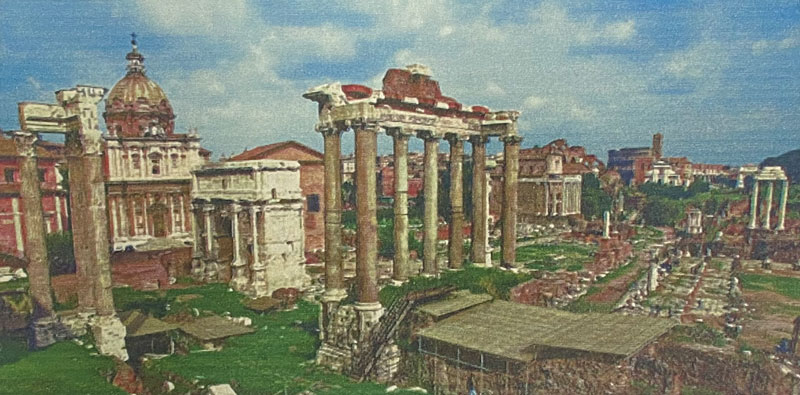LIVING AMONG THE “RUINS”

Alongside the road to Beaufort, S.C., near Yemassee, stand the still imposing ruins of Old Sheldon Church. Originally built between 1745 and 1753, it was used by American patriots during our Revolutionary War to store arms; hence it was burned down by the British in 1779, and rebuilt in 1826. Tradition has claimed that it was again burned and gutted by the marauding devils from General Sherman’s army of pillagers and despoilers during The War For Southern Independence, but fairly recent evidence in a letter from an on site visitor in 1866 claims that Old Sheldon was NOT burned down in 1865 by Yankees but was gutted by the locals after that war, and its materials used all over Beaufort, S.C.
Be that as it may, the ruins presently stand in grand and haunting majesty, reminders of a time that once was, but is no more—reminiscent, I fear, of the possible fate of our increasingly ravaged Constitutional Republic. I’ve never been to see Old Sheldon Church, but I’m sure that some of you have. It’s impressive even as a ruin.Our world is full of fascinating ruins, fragmentary memories of other times and great civilizations that once existed but now are only chapters in history books and archaeological journals. The truly unique people who built a civilization along the Nile River in Egypt endured for almost 3000 years, but are now memorized by crumbling structures, mysterious pyramids, paintings, papyruses, carvings, and hieroglyphic histories on the walls of their tombs and temples. The ancient Greeks left us many mementos of their intriguing civilization—beautiful temples and amphitheaters, and their scrolls of plays and philosophy and science. We in the western world owe much to these ancient Greeks, but they never did learn to live together in harmony, preferring to maintain their political structure of mini-city states which engaged in almost constant warfare with each other.
The ancient Roman Republic (509 B.C--27 B.C.), which thereafter deteriorated into Imperial Rome, ruled itself fairly well for around 500 years, leaving us, along with the later Empire, with great ruined structures, and a language—Latin—that provided the basis for some of our modern languages and laws. After the Republic ceased to exist, the mighty Caesars, most of whom were loathsome creatures, ran out of subjects to worship them and to tax to death, having killed off the best of their people in endless wars to try to preserve a vast empire which slowly became unpreservable. Roman civilization did not end with a bang, but with a whimper over many generations, as her people discovered what Americans are swiftly discovering—that there is NO such thing as “a free lunch”.
One of my very favorite authors is the late Taylor Caldwell (1900-1985), who wrote many fascinating historical novels from the early 1940’s until the early 1980’s, and also for many years wrote for that great conservative journal, American Opinion, published by The John Birch Society, and the predecessor of The New American Magazine (one of the best sources for truth on the internet). Back in 1957 she published a penetrating and very disturbing short story about an “ancient land” she called HONORIA, a land where many of us might have felt right at home, at least for a time.
THE STORY OF HONORIA
As Caldwell cautioned at the outset, it was a “true story about a nation which was once great…. (B)ut you will readily guess her true name, as the story unfolds.” Honoria was started by people who wanted to be free—pilgrims who had fled their native land to escape oppression. Honoria’s founders were tired of “endless wars, endless taxation, endless bureaucrats, and endless arrogant rulers. In the sight of their gods---they had established a new nation.” Many generations went by, and these new colonies were flourishing. Onto their buildings they carved noble words: “Liberty”, “Justice”, “Freedom of Worship”. Great literature and philosophy that we still read today was written by the Honorians. God blessed these colonies, not yet one nation, but becoming one in spirit. Slowly, life changed and these colonies decided to become a nation.
Eventually, Honoria became a Republic, with three houses of government: The Magistrates (5 were elected to serve various functions, for only one-year terms), The House of Assemblies & Tribunes, and The Senate, which was the most powerful. In the early years the Senators ruled justly and with honor. In those days, the people distrusted militarism and hated the endless wars of the other nations. The Honorians believed in freedom under divine guidance. But tragically, after many generations had passed, a bloody, fratricidal civil war divided the Republic of Honoria. A “conspiracy”, ending in assassination, claimed a famous leader of the Republic—a leader who was admired but who had many enemies. We all know this man. One of his best friends, an army general, avenged his death most terribly. Honoria never recovered from that death, and that vengeance.
It didn’t take long for Honoria to become a world power. Other countries envied and hated her for her prosperity and influence. Caldwell wrote: “Prosperity does not automatically bring virtue, nor does it always sustain it. Honoria was powerful. Her ships ranged everywhere. The old, corrupt countries sent ambassadors to Honoria. Tens of thousands of immigrants came to Honoria from these old countries. Many of them went like the ancient pilgrims, fleeing from oppression. But many came because Honoria was rich, and they cared nothing for her traditions.”
All too quickly, many in her government became ambitious and hungered for power and control, which brought the inevitable corruption. Honoria became a land of factions and political parties who cared only for their own self interests. Those in the Senate, and the people who willingly allowed themselves to be corrupted by the lure of free benefits provided by the government, began to ridicule the founders of the nation, and belittled what they had stood for. “The Senators…became rich in worldly goods, but very poor in knowledge of what had made their nation great. They began to despise the very Republic for which they stood. For a price, they would even betray their country.”
Hmmmmm—this is beginning to “sound familiar”, isn’t it? Honoria had grown strong by avoiding foreign entanglements, but now it sought them. Its people were assured by their leaders that wars were necessary to defend their civilization; as a result, endless wars followed, as they always do when one country meddles in the affairs of another, and the citizens listen to the siren songs of the demagogues who insist that wars are necessary to secure the homeland and spread “democracy”, or spread freedom to oppressed people. These wars brought Honoria the appearance of prosperity and increased trade, and took the people’s minds off of the growing problems in their government. Soon, the people of Honoria discovered that they could vote themselves largess from the public treasury by electing deceiving and unscrupulous politicians. Free mass entertainment kept the people from realizing what was happening to them. Many of their religious leaders sided with the politicians and the government, and the rest of them were too fearful—too cowardly--to protest. Taxation became so burdensome that the middle class was slowly reduced to despair. Honoria’s money became debased and worthless, and inflation wreaked its terrible vengeance. The people worked hard to forestall the inevitable, but to no avail. Crime became commonplace. Morality died with just a few protesting whimpers.
Before the end, “Honoria joined a league of the world, with her enemies, who exploited her. She taxed her citizens more and more to send her wheat and meat to those other nations.” In only a few decades, Honoria had become corrupt and hated throughout the world. “The very walls of government echoed to the ever growing demands for more foreign aid, more security, more bread, more sports, more government, more restrictions on the proud and the self-respecting citizens.” Finally, the once-prosperous and honorable middle class died out—unable to cope with heavy taxation and the corruption of their morality. In time, the aggressive barbarians from other countries moved in and took over most of Honoria, leaving only a hollow and decaying shell, for her soul had died long before. Eventually only sad, magnificent, but decaying structures were left, monuments to Honoria’s “once upon a time” greatness, but her people had been destroyed or reduced to the level of serfs in the very country that their ancestors had sacrificed their blood and lives to give them. As time passed, the people forgot their “Patria” in their struggle just to stay alive.
Thus, the ANCIENT ROMANS passed into history and into legend, leaving only the ruins and fragments of their once memorable civilization. As you’ve surely already concluded, “Honoria” was ancient Rome. Or was it? I’ve often heard it claimed, and I’m sure you have also, that there IS an “eerie” similarity between ancient Rome and our country, the U.S.A., in both its founding and its progress from individual freedom and responsibility into a gradual serf-like dependence on a huge and “benevolent” government. Whether or not the similarities are prophetic remains to be seen, but the parallels between the two are very troubling, are they not? Rome permitted a slow erosion of her constitution and her once-strong morality, just as we Americans have been doing since 1865.
As Caldwell wisely reminded us: “Everything which strikes at our Constitution brings us closer to death as a free nation, just as Rome died. Each time the Supreme Court or the President or Congress violates the Constitution, we come closer to slavery—as Rome came…. So long as Rome remained ROME—patriotic, proud, virtuous, and healthy—she remained a strong and powerful nation. When she became internationalistic,… (and) permitted her rulers to become dictators, enmeshed herself with the problems of aliens and taxed her own people to support those aliens, she began to die.” ( Recall that Caldwell wrote this 64 years ago!)
IS THE U.S. REALLY “HONORIA”?
Caldwell reminded her countrymen that, “Nearly 2000 years stand between us and the fall of the Roman Republic (in 27 B.C.). Never before the rise of Rome, and never since, did two nations so remarkably resemble each other in history, in splendid rise in civilization, in magnificent communication between nations, in grandeur and wealth. In strange and amazing ways, WE are the counterpart of ancient Rome. Her history, almost step by step, is OUR history…. Shall we continue along the path which led to the extinction of Rome? We have made her terrible mistakes; we have duplicated her crimes and stupidities, almost to the letter. We are destroying our Constitution, the only safeguard we have in the face of domestic and foreign enemies, just as Rome destroyed hers. We are permitting government by men, now, instead of government by law, just as Rome finally did.”
FOREBODING WORDS TO REMEMBER
Sixty-four years ago, Caldwell gave her countrymen a serious, disturbing, and perhaps all-too-prophetic warning that leaves me totally frightened. I leave you with this great patriot’s words of wisdom, and introspection: She warned us that “it is a well-established, and inviolable, lesson of history that NO NATION THAT RUSHED TO THE EDGE OF DESTRUCTION AS A SOCIETY EVER TURNED BACK! NOT EVER, IN THE 6000 OR SO YEARS OF RECORDED WORLD HISTORY!” We Americans are now on the edge of that terrifying abyss, and the deceitful purveyors of collectivist perfidy seem determined to push us over that edge, vowing to “fundamentally transform” our America into an unrecognizable tyranny. Will we, can we, turn back? Are we that unique? For the sake of the future, and for the survival of freedom, I hope we are!













